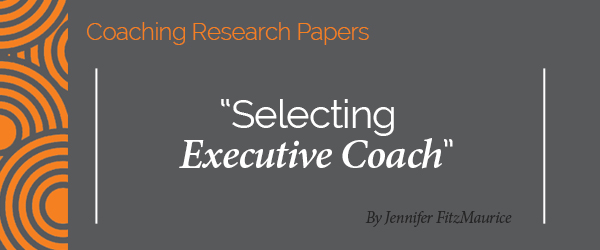 Research Paper By Jennifer FitzMaurice
Research Paper By Jennifer FitzMaurice
(Executive Coach, UNITED STATES)
I never cease to be amazed at the power of the coaching process to draw out the skills or talent that was previously hidden within an individual, and which invariably finds a way to solve a problem previously thought unsolvable.― John Russell, Managing Director, Harley―Davidson Europe Ltd.
Introduction
The [coaching] profession appears to be growing, with an estimated 47,500 professional coaches generating close to $2 billion in annual revenue, according to the 2012 International Coaching Federation (ICF) Global Coaching Survey.
In my current role, I frequently am asked to hire and match coaches with executives. Before attending International Coaching Academy (ICA), my decisions were primarily based on gut instinct and what I had learned about recruiting great talent over the years. As the industry is currently unregulated, it’s not always easy to find and select great coaches.
The robust competency models offered by ICF and other coaching organizations provide a great resource for both coaches and executives to consider. Still, I thought it might be useful to hear from executives directly how they would respond to the question: What background and qualities do you look for when selecting an executive coach?
In addition to satisfying my natural curiosity, answering this question should increase my ability to hire great coaches, counsel executives looking to hire a coach, and evaluate and develop the coaches in our external coaching cadre.
Methodology
I elected to survey internal leaders at my company who had participated in coaching as part of a global leadership development program. Following a 2-day immersive learning experience, participants continue to meet monthly in small-group coaching sessions with an external executive coach.
To create the survey, I compiled a list of coaching competencies from various sources including the International Coaching Federation (ICF), the World Association of Business Coaches (WABC), and the European Mentoring and Coaching Council (EMCC). In addition, I reviewed the qualifications and competencies from additional sources including Harvard Business Review (HBR), Stanford University, and the American Society for Training & Development (ASTD).
While the models differ in their structure and their orientation, there is a strong overlap in the attributes, particularly in regard to the ability to build relationships, maintain confidentiality, provide feedback and support their clients in realizing insights.
From these lists, I constructed a brief web-based survey to capture participant rankings on each of the criteria (Figure 1). The survey was broken down into background, qualities, coaching process, and open-ended comments. See Appendix 1 for the complete survey questionnaire.
The survey was sent to 45 internal leaders at my company. Of the 17 participants who responded to the survey, 41% were male and 59% were female. 71% had between 16 and 25 years of experience, while 12% had less than 15 years and 18% had more than 26 years of experience (Figure 2).
Figure 1 – Comparison of research survey to industry competency models
| Research Survey | ICF | EMCC | WABC | |
| Self-aware/ Self understanding/Self management | ||||
| Self-aware | Behaves in alignment with values, self management; EQ | Knowing oneself and self-mastery | ||
| Committed to personal development | Commitment to self development | Maintaining/improving professional skills | ||
| Multicultural/diversity | Business/leadership: systems thinking; business alignment and acumen; role model; coaching business; OB/OD; assessment; multicultural sensitivity | |||
| Setting the foundation | ||||
| Ethics, integrity, honesty, confidentiality | Meeting ethical guidelines and professional standards | Ethical; confidential | Integrity, ethics, professional standards | |
| Managing the contract | Establishing the coaching agreement | Managing the contract | Agreeing on clear and effective contract | |
| Uses models and frameworks / clear methodology | Use of models and techniques | |||
| Co-creating the relationship | ||||
| Building relationship/rapport; engendering trust; being non-judgmental | Establishing trust and intimacy with the client | Building the relationship; builds trust; adapts style | Developing the business coaching relationship; establishing rapport | |
| Personality/presence | Coaching presence | |||
| Communicating effectively/ Promoting client understanding | ||||
| Listening skills; curious; observant; shows empathy | Active listening | Uses active listening; Demonstrates empathy; Attentive | Listening to understand | |
| Ask the right questions | Powerful questioning | Range of questioning | Questioning effectively | |
| Direct communication; objective | Direct communication | Communicating clearly | ||
| Facilitating learning and results/ Facilitating personal transformation | ||||
| Facilitates awareness; gives effective feedback ; generates insight / learning | Creating client awareness about important aspects | Enabling insight and learning; offers feedback; identifies patterns | Facilitating depth of understanding | |
| Promotes action | Designing future actions | Outcome and action orientation ensures client taking responsibility; identify barriers | Promoting action | |
| Planning and goal setting | Focusing on goals | |||
| Provides encouragement; follows through; evaluates progress | Managing progress and accountability | Evaluation process; reviews progress and learning; resistance to change; formal feedback process | Building resiliency; managing termination | |